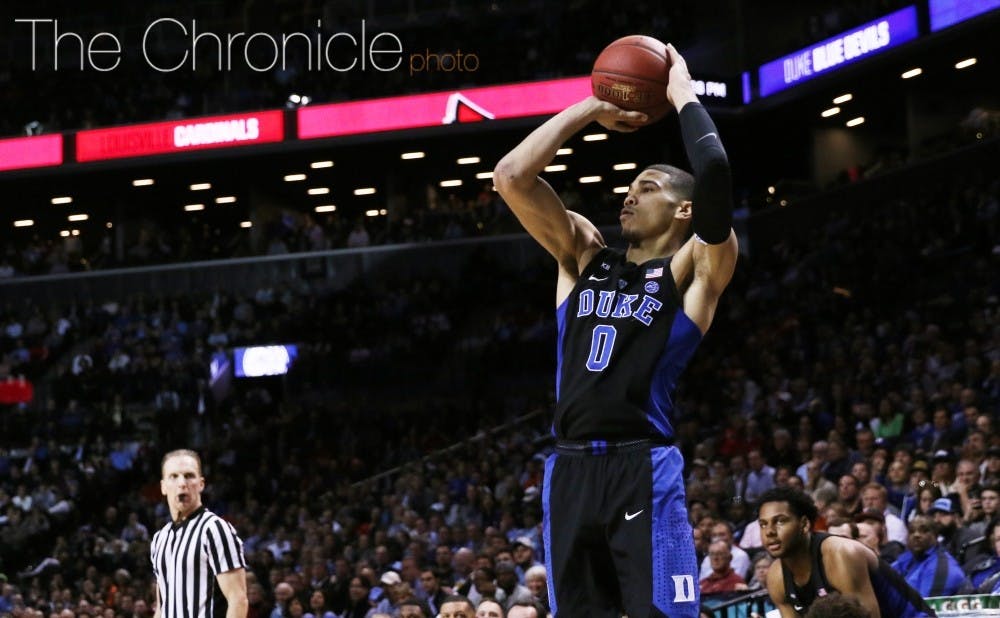By now, Duke fans are familiar with the one-and-done trend that has swept through college basketball.
The Blue Devils lost a trio of freshman—guard Frank Jackson and forwards Jayson Tatum and Harry Giles—to the NBA Draft this offseason, raising Duke’s total to 10 one-and-dones since 2011.
Although the Blue Devils haven’t yet adopted Kentucky’s more media-centric, ESPN 30-for-30-producing approach to attracting high school talent, there is no question that Duke has fully leapt into the one-and-done game and there may be no turning back.
But not every top-tier prospect to enter college in the past few years has opted for Duke blue, Big Blue Nation or any other traditional powerhouse.
Ben Simmons—the top pick in the 2016 NBA Draft—spent his freshman year at LSU and served as nothing more than a reminder that the Tigers have a basketball team. Meanwhile, two likely top-10 picks in the upcoming draft in Washington’s Markelle Fultz and N.C. State’s Dennis Smith Jr. spent their lone college years competing for nothing more than potential bids to the NIT.
Although college hoops is still nearly four months from tipping off, high school senior Mohamed Bamba’s recent decision to spurn both Duke and Kentucky for Texas has already given Longhorn fans something to cheer about—as long as Bamba can lead the program to more success than fellow top-three prospect Myles Turner did in his underwhelming 2014-15 season in Austin. No. 1 overall prospect Michael Porter Jr. could have played anywhere in the country, but chose Missouri, which is coming off a less-than-spectacular 8-24 season.
In today’s one-and-done era, the first thought that comes to mind is that these players are simply using college basketball as a pit stop on the road to their NBA dreams. It paid off for Simmons, looks increasingly likely for Fultz and Smith and is certainly in play for Bamba and Porter.
As the focal point of their respective teams, each player has or had the opportunity to showcase their skillset and take full control on the court. Without the same level of pressure to win games that comes from playing at the likes of Duke or Kentucky, these prospects can take a season to hone their talents and flash the potential that catches the eye of NBA teams.
Some fans are upset by the decisions of prospects to take on the solo-star role because it hurts college basketball—a product most marketable when traditional powerhouses are competing for titles. Watching Simmons’ woeful LSU team struggle to play cohesively or chugging coffee to stay up and watch Fultz and Washington get trounced in late-night Pac-12 action is not particularly appealing for the casual fan.
For others, the decision to spurn a blueblood is an opportunity to criticize the character of a 17 or 18-year old. To some, it seems that Porter can’t possibly care about winning if he decided to join a Missouri program that has never made a Final Four.
But it’s time for college basketball fans to realize that the solo-star trend will continue and should be embraced as the possible future of the one-and-done movement.
Prospects choose schools based on a number of factors that may not align with what many expect. For Simmons and Porter, family ties played a big factor in their decisions, and Fultz valued Washington because of his personal connection to then-head coach Lorenzo Romar. In recent years, playing time has become a more important consideration as some programs have built deep rosters through the transfer market.
Although some players may see the allure of competing for a national title under a legendary coach, others may not value it as much, and that should be 100 percent okay. Just because we want to see the best prospects at the best schools doesn’t mean that players should be judged if they have different intentions.
Perhaps the most troubling outcome the solo-star trend has perpetuated is a growing divide between success in the NBA and college. But with the products already looking very different on the court, this split was inevitable. If you don’t believe me, just consider that National Player of the Year Frank Mason III is a fringe second-round prospect.
At the end of the day, a season of college basketball holds very little value to a promising high school star concerned about his NBA future. It’s hard to say that Simmons, Fultz or Smith turned out definitively better or worse from their year on a college campus.
That’s why more and more players are exploiting loopholes to avoid playing college basketball altogether. Emmanuel Mudiay spurned college to play in China for a year in 2014-15, and Kentucky’s Hamidou Diallo joined the team midseason this spring and tested the draft waters without appearing in a game before ultimately deciding to return to school. Players know they don’t need to play on ESPN every night in college to catch the eyes of scouts.
And maybe that should teach fans to truly appreciate the one-and-dones that still value the college game.
If it wasn’t obvious already, De’Aaron Fox bawling his eyes out after Kentucky’s Elite Eight loss to North Carolina should have made it crystal clear that Lexington was more than a pit stop for him. Some claimed that Jayson Tatum was more concerned with his draft stock than his team early in the regular season, but try making that case after watching the freshman carry Duke to an ACC championship.
Although we don’t like the idea of players prioritizing their NBA dreams while still in school, it’s time to accept it and embrace the entertainment they bring to the table.
Get The Chronicle straight to your inbox
Signup for our weekly newsletter. Cancel at any time.

